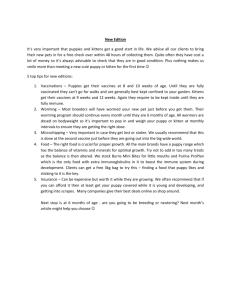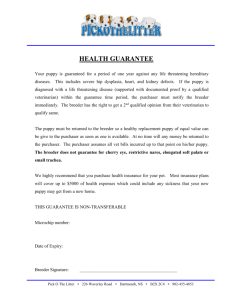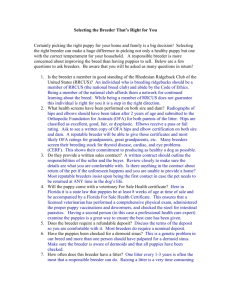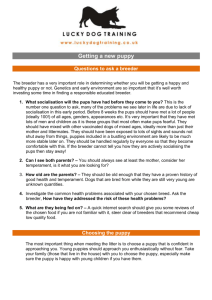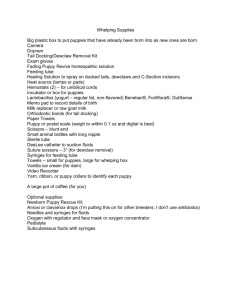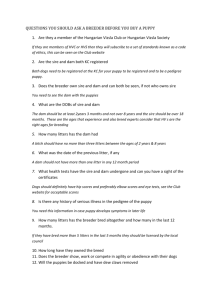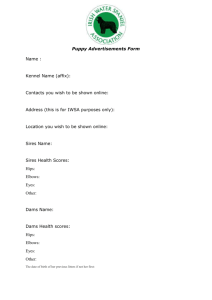What Should I Know About Buying a Welsh Springer
advertisement
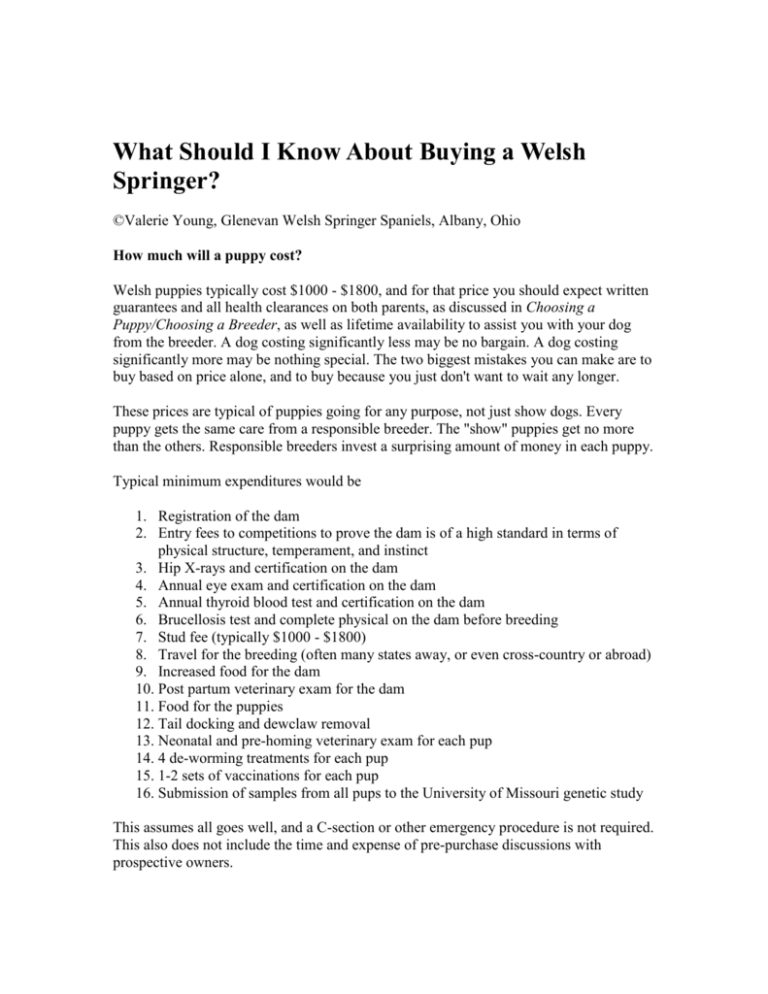
What Should I Know About Buying a Welsh Springer? ©Valerie Young, Glenevan Welsh Springer Spaniels, Albany, Ohio How much will a puppy cost? Welsh puppies typically cost $1000 - $1800, and for that price you should expect written guarantees and all health clearances on both parents, as discussed in Choosing a Puppy/Choosing a Breeder, as well as lifetime availability to assist you with your dog from the breeder. A dog costing significantly less may be no bargain. A dog costing significantly more may be nothing special. The two biggest mistakes you can make are to buy based on price alone, and to buy because you just don't want to wait any longer. These prices are typical of puppies going for any purpose, not just show dogs. Every puppy gets the same care from a responsible breeder. The "show" puppies get no more than the others. Responsible breeders invest a surprising amount of money in each puppy. Typical minimum expenditures would be 1. Registration of the dam 2. Entry fees to competitions to prove the dam is of a high standard in terms of physical structure, temperament, and instinct 3. Hip X-rays and certification on the dam 4. Annual eye exam and certification on the dam 5. Annual thyroid blood test and certification on the dam 6. Brucellosis test and complete physical on the dam before breeding 7. Stud fee (typically $1000 - $1800) 8. Travel for the breeding (often many states away, or even cross-country or abroad) 9. Increased food for the dam 10. Post partum veterinary exam for the dam 11. Food for the puppies 12. Tail docking and dewclaw removal 13. Neonatal and pre-homing veterinary exam for each pup 14. 4 de-worming treatments for each pup 15. 1-2 sets of vaccinations for each pup 16. Submission of samples from all pups to the University of Missouri genetic study This assumes all goes well, and a C-section or other emergency procedure is not required. This also does not include the time and expense of pre-purchase discussions with prospective owners. $1000 - $1800 seems like a lot of money to pay for a puppy, but add up food and preventive-care vet bills for a couple of years and you get about the same number. Also, many breeders offer in their contracts rebates for things like spaying/neutering, completing obedience classes, completing certain health screening procedures, and earning titles. A puppy from a responsible breeder should come with a guarantee that will compensate you if the pup does have a hereditary disease, and with a lower likelihood of having such a disease in the first place. People see the price of a puppy and think breeders are getting rich selling Welsh Springers. If they're breeding responsibly, they're not. A rule of thumb is 1 puppy to pay the stud fee, 1 to pay for travel to get the breeding and the pre-breeding vet-check and health clearances on the dam, 1 for the food and vet bills for dam and pups, 1 for entry fees to competition. This doesn't count travel expenses to competition, the normal expenses of having any dog (annual vet visits, food), or emergency procedures. It doesn't count time cleaning up, socializing, etc. either. It doesn't count the money a good breeder spends to educate himself/herself: buying books and videos, attending seminars and workshops and classes. What about exercise and training? Welsh like to be WITH their owners, are sometimes called "Velcro Dogs", and are definitely not "lie over there on the rug" dogs. They are active and need good constructive exercise. They are especially happy in a home with someone who wants to hunt, do obedience or agility, or hike. Without sufficient exercise, they can be downright pesky in the house badgering you to DO something, or they will invent their own entertainment like digging, barking, chewing, and escaping. Properly exercised in mind and body, they are easy to live with and calm in the house. Our guideline, particularly for young Welsh, is that they need at least an hour a day at least five days a week of exercise with their humans, plus "business trips" (opportunities to potty). Ours have housebroken quickly. We highly recommend basic obedience classes for every Welsh and their humans. Even as experienced owners, we take all of ours to class. It is the best way to accustom them to minding in the presence of distractions like other dogs. We recommend finding a class that takes a mostly positive approach. Most people find that a puppy kindergarten and then a basic class meets their needs for a family companion, though once you start you may decide you want to continue to higher levels. Are puppies always available? Good Welsh breeders produce puppies infrequently (1-3 litters a year or fewer) and are pretty picky about where their pups go, so be prepared to answer lots of questions. It is common to have to wait for a puppy. Often the best route is to talk to breeders until you find one you trust, and then get on a waiting list for a puppy his/her next litter. Why is the breeder asking all these personal questions? Many responsible breeders will ask you to fill out a questionnaire, or will interview you extensively via e-mail or phone before they will put you on their waiting list. Some even require meeting you first. (We do.) The breeder is trying to learn about your lifestyle and your plans for and commitment to this puppy. The breeder wants to match puppies with the best possible homes so that they will have homes for life, homes where they will become well-trained, well-socialized, well-cared-for credits to the breed. If you don't want to answer personal questions, go somewhere else to get a dog. We make judgments about whether other people have the resources and commitment we think are necessary. Sometimes our judgment may be wrong, but we make it. We want our puppies to fit so well into their families that giving them up would be a momentous decision, and we want to be positive that in such serious circumstances the puppy would come back to us. We know very well how short the life expectancy is for a puppy in the wrong home, and we consider screening prospective buyers to be perhaps the most important obligation of a responsible breeder. What's Limited Registration? Pups are often sold to pet homes on "Limited Registration", meaning that they are not to be bred and their offspring are not registerable. This is to protect the breed from casual breeding by people who have not taken the time to research the essentials of health, temperament, and conformation. Our breed is in good shape relative to some that have been casually-bred, and we like it that way. For the committed owner who decides to become involved in conformation showing and breeding, it is possible to convert the Limited to a Full Registration, with the consent of the breeder. If that is important to you, you should discuss conditions for doing so prior to purchase. A pup on Limited Registration is absolutely purebred, and is eligible for competition in obedience, agility, hunting tests, every AKC event except conformation showing. Valerie Young

